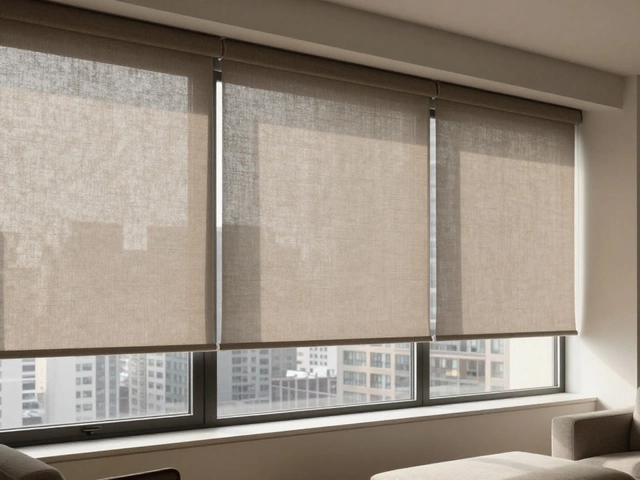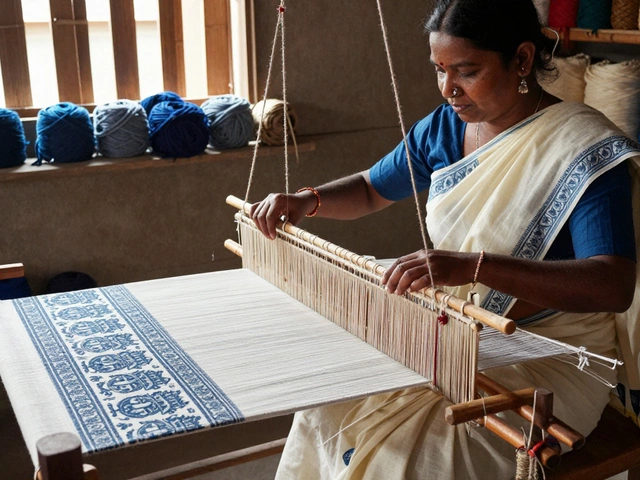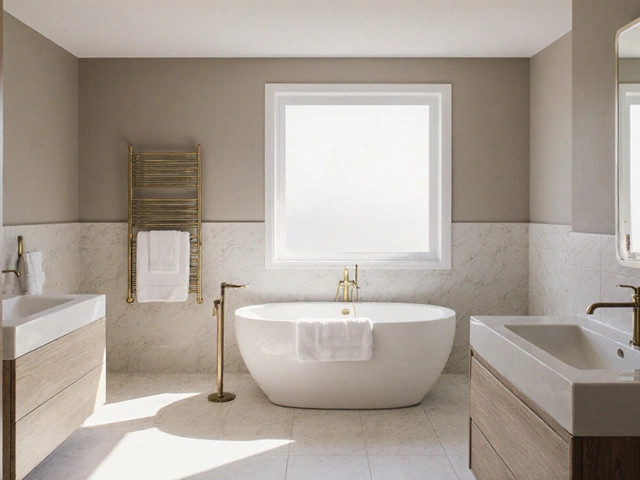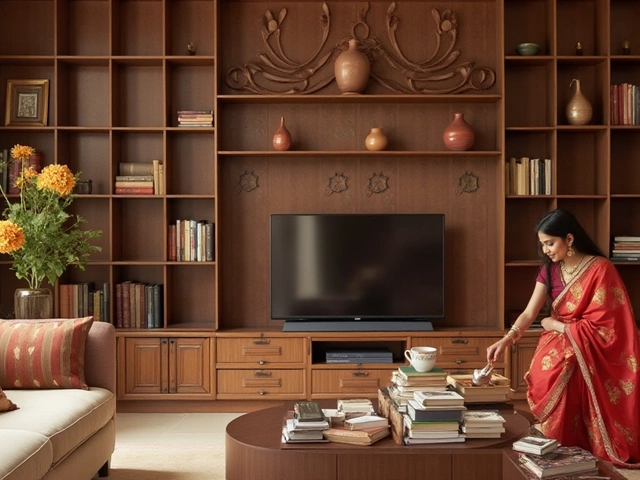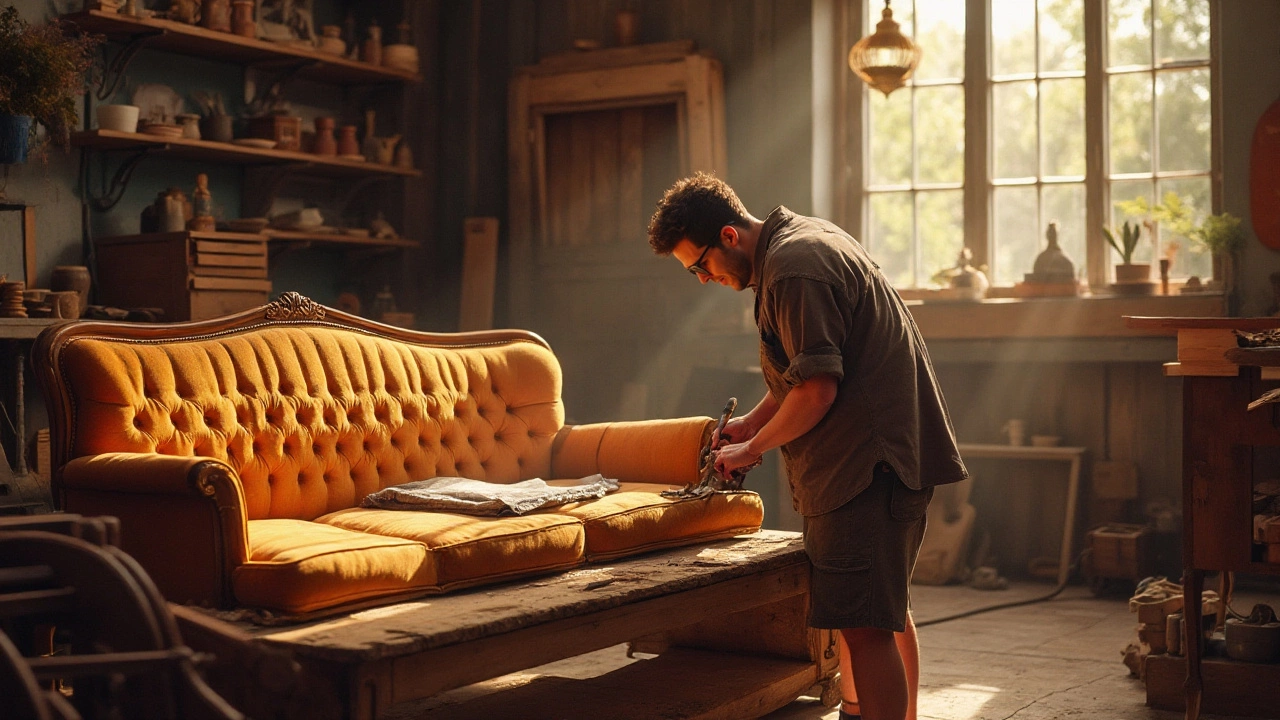
Ethan Allen furniture is synonymous with classic American style. With roots that date back decades, this brand has managed to garner a reputation for quality and style. But amidst the global marketplace, questions often arise about where their pieces are made, especially when considering the ever-imposing presence of Chinese manufacturing.
Many customers wonder whether Ethan Allen's beautiful sofas and other furniture items are crafted here on American soil or if they carry the mark of international production. These curiosities aren't unfounded and play a significant role in how people perceive quality and authenticity in their purchases.
This piece unfolds the story behind Ethan Allen's manufacturing processes, providing insights into their proud traditions, diverse manufacturing locations, and the skilled craftsmanship that defines their products. For those seeking genuine Ethan Allen pieces or simply curious about the brand, understanding where their furniture originates can bring clarity and confidence to their home furnishing decisions.
- Ethan Allen: A Brief History
- Manufacturing Locations
- The Craftsmanship Behind Ethan Allen Sofas
- How to Identify Authentic Ethan Allen Pieces
- Consumer Perceptions on 'Made in China'
- Tips for Choosing a Quality Sofa
Ethan Allen: A Brief History
Dating back to 1932, Ethan Allen was founded in the heartland of America by two insightful and visionary brothers-in-law, Nathan Ancell and Theodore Baumritter. Initially known as the Baumritter Corporation, the company ventured into the world of furniture making with a fresh perspective, focusing firmly on traditional American styles that resonated with the colonial charm of early New England. Their efforts paid off, as customers quickly fell for the detailed colonial-inspired designs and the quality craftsmanship they perfected. The name Ethan Allen was adopted in 1939, inspired by the great American Revolutionary War hero, to evoke a spirit of fortitude and independence. Fast forward through decades punctuated by economic shifts and evolving public tastes, Ethan Allen has managed to sustain and even expand its brand, while still committing to their founders' vision of producing elegant yet accessible furniture for every American home.
The journey did not simply involve crafting fine furniture but nurturing a robust network of retail outlets. From its earliest days, the company's strategy was geared toward vertical integration. By overseeing everything from design to manufacturing and retail sales, Ethan Allen ensured precise quality control across their production chain. This distinctive approach allowed them to maintain high standards for their furniture while also having better insights into consumer needs. As a result, it's not surprising that their meticulous attention to quality and style has nailed them a spot in over 300 retail locations in the United States, along with several across Canada and the rest of the globe. The company's commitment to providing premium-quality products extends to their close collaborations with talented designers and artisans who infuse their skill and creativity into every piece.
Amidst the transformations seen over the decades, Ethan Allen has managed to retain an unwavering commitment to traditional values and quality. Notably, the brand continues to showcase its dedication to domestic manufacturing, with over 70% of its products still being crafted in North American workshops. This fact is a point of pride and distinction for the brand, reinforcing its standing as a genuine purveyor of American furniture. Adhering to stringent manufacturing standards, Ethan Allen's pieces are known for their solid construction and impeccable finishes, attributes that have cemented its reputation within the sprawling world of furniture manufacturers.
"Our commitment to quality and service is unmatched in today's marketplace," shares Farooq Kathwari, CEO of Ethan Allen, capturing the essence of what has become a principal component of the company's enduring legacy.As time advances, so does Ethan Allen's pledge to environmental stewardship. They strive to integrate sustainable practices through responsible material sourcing and efficient manufacturing processes. The company's efforts span beyond mere rhetoric, as evidenced by their employment of renewable resources and eco-friendly finishes that underscore their devotion to sustainability. For a brand deeply rooted in the essence of American craftsmanship, Ethan Allen's trajectory serves as a remarkable narrative of growth, tradition, and unyielding dedication to its founding principles.
Manufacturing Locations
When delving into the origins of Ethan Allen furniture, it's important to understand both historical and modern manufacturing strategies. Ethan Allen Interiors Inc., a brand that evokes a sense of traditional American quality, makes a conscious effort to maintain a substantial portion of its production within the United States. Currently, they operate several manufacturing plants domestically, ensuring that the essence of American craftsmanship is present in many of their pieces. This strategy is part of their identity, which they maintain via large facilities in states such as Vermont and North Carolina. By focusing on US-based production, the brand supports local economies and keeps its design and assembly processes transparent.
While they remain firmly rooted in the US, the brand does not shy away from the global market. Some components of their furniture are sourced from international locations, including Mexico and Honduras. This hybrid approach to sourcing materials and manufacturing helps Ethan Allen balance quality with cost-effectiveness. They ensure that any international production adheres to strict quality controls, preserving the fresh designs and sturdy construction synonymous with the Ethan Allen name.
The notion that some Ethan Allen products could be manufactured in China often sparks debate among potential buyers. It is worth noting that the brand has been transparent about its operations. From sourcing raw materials to assembling the final product, Ethan Allen ensures that rigorous standards are maintained across borders. In an enlightening interview, Ethan Allen's CEO once stated,
"We believe in creating designs that complement today's lifestyles while reflecting the company's storied heritage."This commitment reflects how they prioritize quality across all manufacturing locations.
For those concerned with the authenticity of their sofa manufacturing, Ethan Allen offers assurances that significant portions of their production, especially those involving more intricate craftsmanship, are proudly American-made. By holding onto this heritage, the brand continues to resonate with consumers who value locally crafted, quality furniture. Their dedication to maintaining production in diverse regions while leveraging global resources exemplifies a savvy blend of tradition and modernity. Whether you discover an Ethan Allen piece in an elegant showroom or a cozy home, you can confidently attribute its origins to a thoughtful mix of American tradition and global acumen.
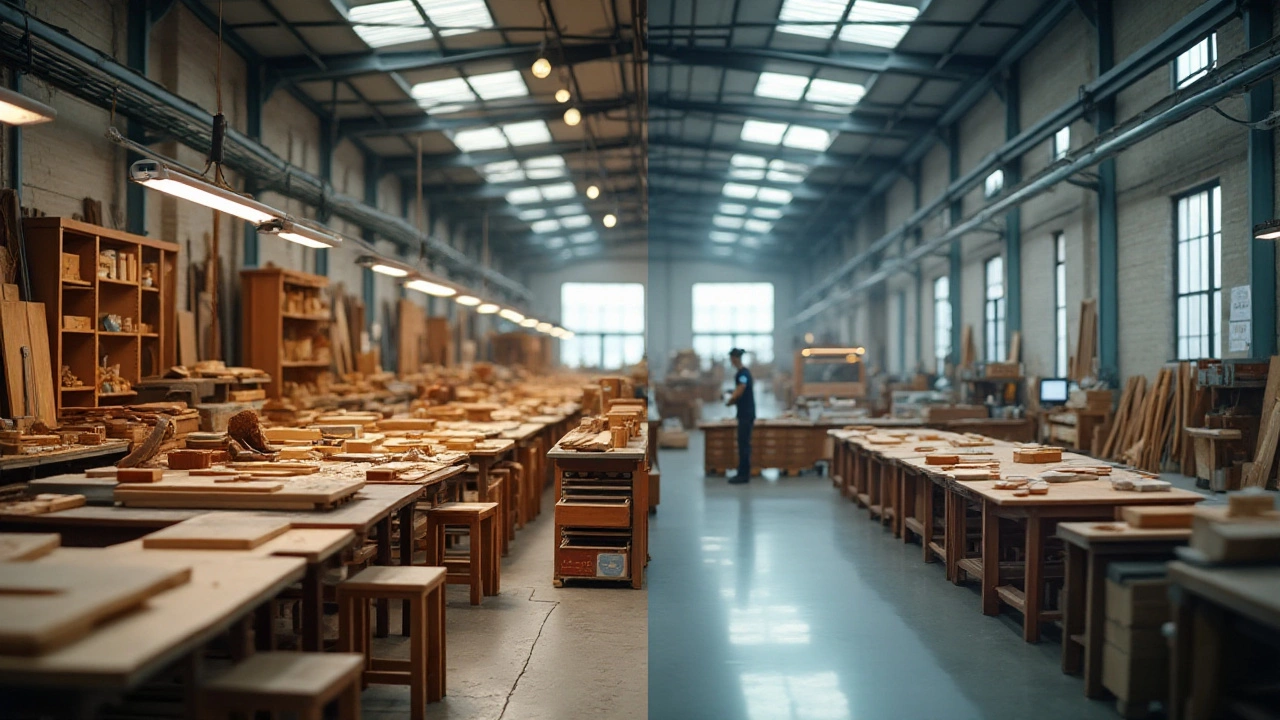
The Craftsmanship Behind Ethan Allen Sofas
The allure of Ethan Allen furniture often lies in its meticulous craftsmanship and attention to detail, which can be traced back to its founding principles. Each piece, particularly their exquisite sofas, reflects a rich heritage that values both tradition and innovation. Their craftspeople, who are often considered artists in their own right, take great pride in transforming raw materials into elegant and functional pieces of art. This dedication to excellence is what sets Ethan Allen apart in the bustling world of furniture manufacturing. From the initial sketch to the finishing touches, every step in the creation of an Ethan Allen sofa is infused with precision and care.
Within Ethan Allen's facilities, mostly located in North America, you'll find that every sofa's journey begins with a high-quality selection of materials. Skilled artisans select the finest types of wood, fabric, and cushioning, ensuring that each component meets the company’s high standards. Once materials are chosen, the frame construction commences. It’s a meticulous process where each frame is built with reinforced joinery, giving the sofa its trademark foundation that promises durability and longevity. This sturdy backbone is essential in crafting a quality sofa that retains its form year after year.
As the frame takes shape, upholsterers come into play, draping each sofa with fabrics that range from elegant linens to sumptuous leathers. They employ both hand and machine techniques to stitch, tuft, and attach fabrics, ensuring seamless and durable joins. The upholstery process is time-consuming and requires a deft touch, as well as a discerning eye for detail. Each sofa is tailored to perfection, down to the precise alignment of patterns and textures. An Ethan Allen sofa isn’t just assembled; it’s curated with an artisanal quality that speaks volumes of its origin.
"Our craftsmanship is about more than assembly; it's a tradition, an art form that has been passed down through generations. We build not just furniture, but legacies." - Ethan Allen Craftsman
Customization is another hallmark of Ethan Allen sofas, giving customers the freedom to select specific styles, sizes, and finishes to match their personal tastes and home aesthetics. This bespoke experience involves close collaboration with designers who understand both the product and the customer's vision. It's not just about choosing a piece of furniture; it's about being a part of the creation process. In a world where mass production often compromises individuality, Ethan Allen takes a different path, offering personalized solutions that elevate home interiors.
Beyond the aesthetics and comfort of their products, Ethan Allen is mindful of sustainability, employing practices that ensure their environmental footprint is minimized. The company promotes responsible sourcing and manufacturing, a step crucial not only for the planet but for maintaining the integrity of their brand. Their dedication to sustainability is a testament to their approach of taking responsibility at every stage—from raw material harvesting to the final moment a piece leaves the factory floor.
Innovation does play a key role; although grounded in tradition, the company isn’t afraid to embrace modern technology to enhance quality and efficiency where beneficial. Yet, this adoption of technology never overshadows the human element that is the core of their craftsmanship. In essence, each Ethan Allen sofa tells its own story, woven with threads of passion, precision, and history—an embodiment of the past's rich heritage and the present's conscientious creativity.
How to Identify Authentic Ethan Allen Pieces
Identifying an authentic Ethan Allen piece, especially one of their distinguished sofas, requires a keen eye and some insider knowledge. Ethan Allen furniture, renowned for its quality and detail, bears distinct characteristics that set it apart from others. First and foremost, genuine Ethan Allen furniture pieces often include a maker's mark or label found on the inside or bottom of the piece. This mark typically includes the Ethan Allen name, though sometimes it includes specific codes related to the furniture line or production batch. It’s not uncommon for these civilly crafted sofas to have a catalogue number stamped or etched into the frame, offering a unique fingerprint of authenticity.
Pay close attention to the quality of materials used. Genuine Ethan Allen sofas are made from high-grade fabrics and leathers that speak to luxury and durability. The woodworking, another hallmark, is often done with solid wood like maple or cherry, known for their longevity. Real pieces are meticulously finished, with smooth edges and a flawless finish. By contrast, counterfeit or lower-quality replicas may have rough edges or uneven finishes, betraying their lack of attention to detail. Additionally, check the construction methods. Authentic Ethan Allen sofas will feature joints reinforced with dowels, screws, and corner blocks, rather than simply being glued or stapled together.
Dennis Young, former Ethan Allen CEO, once noted in an interview: "Ethan Allen is built on craftsmanship that can be seen as much as felt—you're not just buying a sofa, you're investing in someone's skill and dedication."
Another way to help verify authenticity is through historical records and catalogues. Ethan Allen has been consistent in keeping records which are accessible for people who wish to trace the provenance of their furniture. A simple inquiry to Ethan Allen headquarters with a piece's catalogue or serial number can often reveal its history and authenticity. They are quite supportive and responsive towards protecting their brand name and ensuring customer satisfaction. Also, check out auction sites and second-hand forums where seasoned sellers and collectors often share invaluable insights and tips on identifying genuine furniture pieces.
Don't overlook the importance of provenance when considering a sofa's authenticity. Provenance refers to the piece's history and ownership, which can sometimes provide context on its authenticity. If possible, ask sellers about the piece's origin and history. A genuine item often has a compelling story or journey attached to it, making it not just a piece of furniture but a piece of art with its own narrative. Also, noteworthy is the role of serial numbers tagged on many Ethan Allen items. Easily found beneath cushions or along the undersides, these can be cross-referenced with company archives for authenticity verification.
To encapsulate, distinguishing an authentic Ethan Allen sofa involves careful scrutiny and awareness. Familiarizing yourself with these identifying features and reaching out to knowledgeable sources for assistance will go a long way. It’s a bit like detective work, but the payoff is rewarding both for your living room's aesthetic and your peace of mind, knowing that you have something concrete and authentic to enjoy and perhaps pass down to future generations.

Consumer Perceptions on 'Made in China'
For many consumers, the label 'Made in China' can stir mixed feelings. It's a mark seen on a vast array of products worldwide, from gadgets to garments, and yes, even furniture. When it comes to Ethan Allen furniture, particularly their exquisite sofas, many wonder about the implications of this label. Some associate the 'Made in China' tag with less expensive products, conjuring images of mass production and cost efficiency. These associations arise partly from the reputation that China holds as a manufacturing giant capable of producing items at a lower cost. Despite this, it's essential to recognize that the quality of production in China can range widely, and many high-end brands do partner with Chinese manufacturers due to their advanced technology and skilled workforce.
In the furniture industry, though, the stakes are different. People value not only how things are made but also where. This brings a unique twist to the story of American furniture, where craftsmanship and heritage are important buying factors. For brands like Ethan Allen, staying true to their identity might mean reassuring customers of their production values, regardless of location. In fact, the brand states that more than 70% of their products are still made in their own North American workshops, a figure that appeals to customers who hanker for that American-made authenticity.
Impact on Buying Decisions
Interestingly, the perception of 'Made in China' has evolved over the years. As international trade norms shift and global brands frequently source from around the globe, ‘Made in China’ doesn’t automatically mean low quality. In fact, some Chinese factories boast cutting-edge technology and stringent quality checks that rival North American and European standards. According to an article published by the International Trade Journal, Chinese exports have, in many sectors, consistently met the quality standards required internationally. This perspective informs many purchase decisions, especially for those who are brand loyal and trust the quality assurance of brands like Ethan Allen.
Yet, a portion of the consumer base remains nostalgic for that genuine American label. To them, a sofa or any other piece of Amazing furniture carrying the local stamp is an assurance of durability and cultural value. This dichotomy of perceptions influences the communication strategy of furniture brands, who often educate their consumers not just about where but how their products are made. Ethan Allen, notably, seems to balance manufacturing sources with a strong emphasis on design and quality control, a stance that appeals to both modern globalists and purists alike.
"The global marketplace today means quality is defined by standards, not borders," says an industry expert featured in The Home Furnishing Journal.
This perspective aligns with how Ethan Allen approaches their product lines; a trust in their manufacturing process transcends the actual geographic origin of their pieces.
Tips for Choosing a Quality Sofa
When it comes to selecting a sofa that not only fits your aesthetic but also stands the test of time, there are several essential elements to consider. Understanding the intricacies of sofa construction can greatly enhance your choice, ensuring both beauty and endurance. One key aspect to look out for is the frame. A sofa's frame is its backbone; hence, hardwood frames, such as kiln-dried oak or maple, are preferred for their durability and strength. These options are less likely to warp or twist over time. Checking for dowel joints, which employ wooden pegs to create a secure connection, can provide insight into the sofa's longevity. This traditional construction method is known for its stability and is even praised by experts as the hallmark of quality craftsmanship.
The comfort of a sofa is largely dictated by its seating support and filling. A sofa's seat or spring support may be crafted using sinuous springs—an 'S' shape that offers firm support—or the more luxurious eight-way hand-tied springs, known for offering exceptional comfort. The quality of the filling is another critical factor; foam density, for instance, determines the cushion's ability to retain its shape. Higher density foams typically suggest long-lasting comfort and provide a more resilient seating experience. Additionally, consider the covering materials. Whether it's resilient leather or a plush velvet, these materials each lend unique advantages and levels of maintenance. As a renowned interior designer once aptly noted: "A quality sofa is an investment in personal comfort and style."
Ensuring you have the right measurements and dimensions is another significant tip for picking your perfect sofa. It's easy to fall in love with a piece on the showroom floor only to find it either dominates the space or is dwarfed by it once brought home. Start by measuring your available space, keeping in mind any doorways the sofa must fit through. A handy trick is to tape the dimensions out on your floor or make a newspaper template. This can provide a clearer picture of how the sofa will occupy your space. Additionally, consider your lifestyle needs—if you have small children or pets, fabrics that are stain-resistant and easy to clean could serve you well.
Another vital consideration is sustainability and ethical manufacturing. As consumers grow more environmentally conscious, the source and processes behind furniture production gain importance. Brands like Ethan Allen uphold ethical standards by ensuring their wood is responsibly sourced. Investigating whether a sofa brand uses sustainable materials or has initiatives like plant-a-tree programs can add value to your purchase. Interestingly, research shows that over 60% of consumers are willing to pay more for sustainable goods, which reflects a growing trend towards responsible consumerism.
Lastly, don't underestimate the importance of seeing, touching, and experiencing a sofa before committing. While online shopping offers convenience, visiting a store allows you to assess the comfort, material feel, and build quality firsthand. This tactile experience helps ascertain whether the sofa truly complements your personal living space. After all, furniture should not just meet functional needs but also bring a sense of joy and satisfaction into your home. So take your time, explore your options, and ensure that your choice not only enhances the aesthetic of your space but is also a testament to personal comfort and lifestyle.
